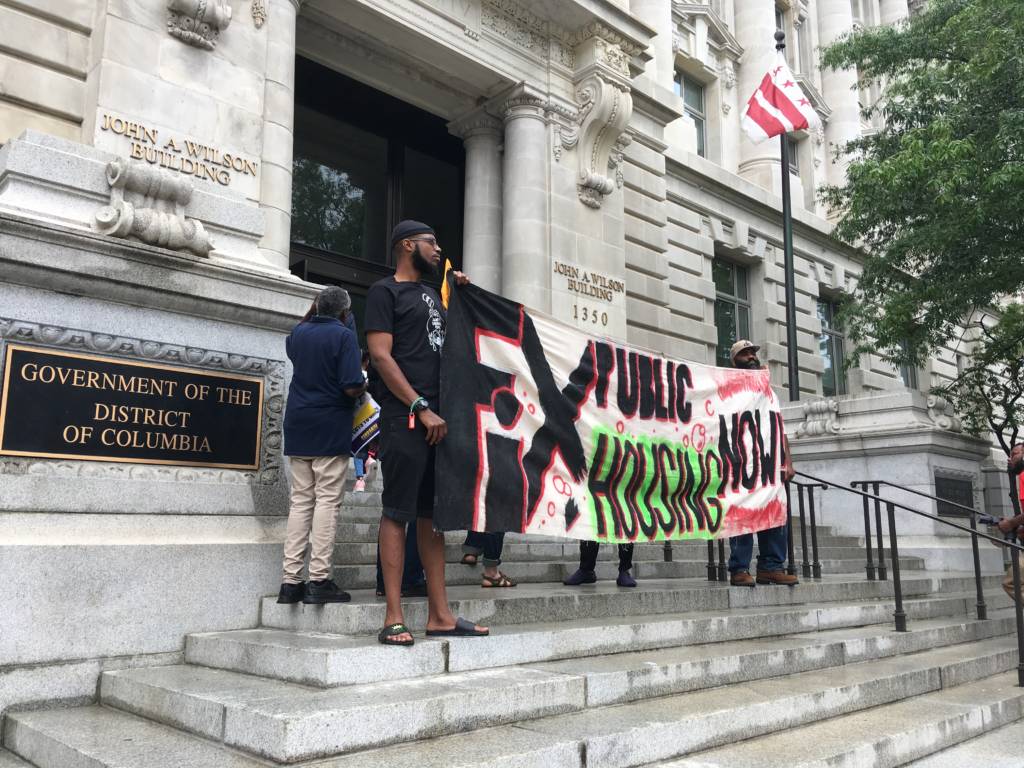When it comes to the fiscal year 2020 budget, one thing is clear: The D.C. Council knows how to compromise.
Council Chairman Phil Mendelson’s amendment to the budget to increase funding for the United Medical Center and to restore limited funding to the previously cut Affordable Housing Preservation Fund seemed to allay the concerns of most everyone present in the council chambers for the second vote on the city budget on May 28.
Most. But not all.
A large crowd of nurses and medical workers wearing black t-shirts emblazoned with the District of Columbia Nurses Association logo clambered into the legislative meeting hoping they could influence lawmakers to do more to restore funding for the District’s only public hospital.
For Roberta Lenoir, president of the nurse’s association, cutting this hospital’s funding makes little sense. In her view, UMC provides a critical service to the community because it is the only full-service hospital east of the Anacostia River. Since “$25 million [out of $40 million] were taken from our budget” she said, “We need to have that restored; [otherwise] it will mean the death of the hospital.”
Chairman Mendelson’s amendment would supplement UMC’s budget with a one-time subsidy of $4 million for a total of $19.5 million. Concerned this level of funding would be insufficient, Councilmember Trayon White introduced a measure to add an additional $3 million to the $19.5 million, scraping together funds from a wide-range of other existing programs.
Concerned about access to emergency medical services in Wards 7 and 8, White referred to a weekend shooting incident, describing how “a woman drove her car to the nearest hospital and that was the UMC.” He then went on to say he couldn’t imagine how the incident would have transpired if the victims had not had access to a nearby medical center. White characterized his proposed additional funding to help keep UMC open as a “drop in the bucket.”
Ward 7 Councilmember Vincent Gray, however, was fervently opposed. He argued that over the years, patient enrollment at UMC has declined 30 percent. According to these numbers, he said, there didn’t appear to be as much a demand for medical services as the debate made it seem. Moreover, he said that since “638 of the 903 employees from UMC live [in] and are from Maryland,” D.C. taxpayers may be inadvertently subsidizing jobs for non-residents.

White’s measure passed with an overwhelming majority, 10-2 with one abstention, bringing the total fiscal year 2020 funding for UMC to $22.5 million, which is more than half the hospital’s previous $40 million.
While Mendelson’s proposed amendment increased support for the Affordable Housing Preservation Fund to $11.5 million, Councilmember Anita Bonds put forth an amendment to add an additional $4 million to the fund. This $4 million would come from the budget approved for the Housing Production Trust Fund during the first budget vote on May 14, reducing the amount for the trust fund from $120 million to $116 million. This amendment passed unanimously, but falls short of meeting the Mayor’s proposal to fund affordable housing preservation at $15 million and the Housing Production Trust Fund at $130 million.
At the end of last year, the D.C. Housing Authority announced it needed more than $300 million in the next fiscal year just to address lead and similar environmental hazards in the most dangerous units in the agencies portfolio. Years of disinvestment from HUD and deferred maintenance has led to such conditions. Mayor Muriel Bowser did not include funds for public housing repairs in her proposed 2020 budget.
Mendelson explained the planned budget would incorporate $24.5 million from the reserve funds of Events D.C., the city’s official convention and sports authority, to fund public housing repairs.
Dispelling concerns from At-Large Councilmember David Gross that this plan would not meet certification from the city’s Chief Financial Officer due to the fund’s obligation to remain dedicated to paying off bonds, Mendelson defended the Council’s plans.“Legislators are those who must assert where taxpayer funds are allocated,” he said.
Mendelson explained that the source of the $49 million would be Events D.C.’s excess revenue and would not detract from their ability to make good on their bond payments. Half of theses funds will go to the public housing repairs while the rest were used to negate a hotel room tax Bowser had proposed as a way of funding investments in 911 technology. He added his opinion was supported independently by both legal counsel and by his private discussions with the city’s Chief Financial Officer.
Moments later, a motion to pass the Fiscal Year 2020 budget was introduced, and the $15.5 billion Budget Support Act was passed. The legislation will go on to the mayor for her signature before being transmitted to Congress.








